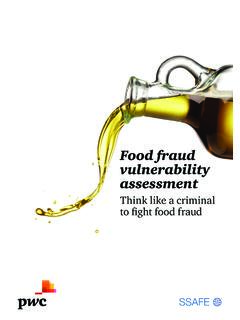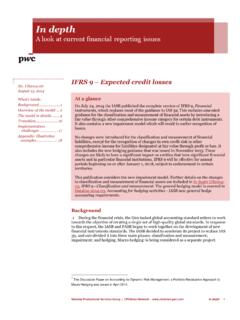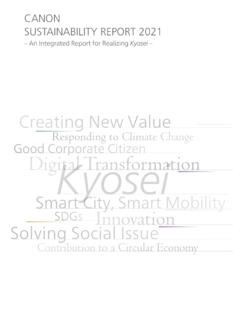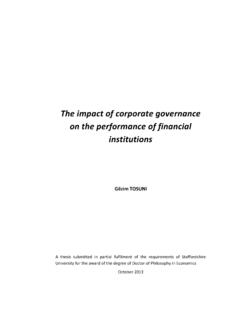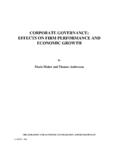Transcription of An overview of financial reporting in the Netherlands
1 1An overview of financial reporting in the NetherlandsAn overview of financial reporting in the NetherlandsFebruary 2020 Welcome to the latest edition of An overview of financial reporting in the Netherlands . As the title already suggests, this booklet provides a general overview of the existing requirements. If you are in need of more information, our advisors will be very happy to assist you on an individual basis. On behalf of PwC Accountants, we hope that you will find this booklet useful. 3An overview of financial reporting in the NetherlandsThis booklet is for those who wish to gain a broad understanding of financial reporting in the Netherlands . It is not comprehensive. The legislation on reporting is sometimes extremely complicated and changeable. We accept no responsibility for what one undertakes without expert advice in response to the content of this booklet. While every effort has been made to ensure accuracy, information contained in this booklet may not be comprehensive or details that are relevant to a particular reader may have been omitted.
2 In particular, this booklet is not intended as a study of all aspects of Dutch GAAP, or as a substitute for reading the Dutch law, the Dutch Accounting Standards, and any interpretations and/or judicial decisions when dealing with specific issues. No responsibility for loss to any person acting or refraining from acting as a result of any material in this checklist can be accepted by PricewaterhouseCoopers. Recipients should not act based on this booklet without seeking professional overview of financial reporting in the NetherlandsFebruary 20204 PwCPreface 71. Legal framework 9 The bv and the nv 10 Setting up a business 11 Relevant corporate bodies of a company 14 To be in compliance 18 Employee benefits 20 Share capital and dividend payments 23 corporate governance 272. Requirements for annual reports 31 The composition of the annual report 32 The size of a company matters 34 Keeping the books and preparation of the financial statements 35 Filing of the annual report 36 Formats of financial statements 38 Notes to the financial statements 433.
3 The core accounting principles under Dutch GAAP 47 General principles 48 Principles on the recognition and measurement of various items 49 Equity and reserves 54 A change in accounting policy, change in accounting estimate or a prior period error? 57 Contents5An overview of financial reporting in the Netherlands4. Consolidated financial statements 59 Definitions and accounting principles 60 Consolidation and exemption from consolidation (Article 2:407 DCC) 62 Consolidation exemption for intermediate holding companies (Article 2:408 DCC) 63 Group exemption (Article 2:403 DCC) 65 Format and content of consolidated accounts 675. IFRS in Dutch financial statements 69 To apply IFRS in the Netherlands 70 Options available for the consolidated and company financial statements 71 Parts of Dutch law are still relevant for IFRS appliers in the Netherlands 73 overview of the key differences between Dutch GAAP and IFRS 746.
4 Company taxation 79 Resident and non-resident taxpayers 80 corporate income tax 81 Capital tax 87 Interest and royalty withholding tax 87 Dividend withholding tax 87 VAT 88 Payroll taxes 89 reporting requirements 90 Tax rulings and Tax Authorities 91 Appendices 93 Appendix A - Book 2, Title 9 Dutch Civil Code (unofficial translation) 94 Appendix B - Terminology 118 Appendix C - Authors 1226 PwCHugo van den EndeRenick van OosterboschMaran Smit7An overview of financial reporting in the NetherlandsThis booklet has been written with the needs of the foreign investor (including multinationals with intermediate holdings) in the Netherlands in mind and aims to address many of the recurring questions raised by clients in is not intended to be a detailed work of reference, but rather an accessible overview of financial reporting for limited liability companies in the Netherlands , including relevant aspects of law, and for existing investors who need, or wish to have, a basic understanding of the key aspects of establishing and operating a company in the specific legislation with regard to banks, insurance and investment companies and other financial institutions is not included in this book.
5 This is also the case for any special rules that are applicable for entities, such as co-operatives, associations, governmental and public sector organisations. In this book, we refer to Dutch GAAP, which covers:The Dutch Civil Code, Book 2 Title 9 ( DCC ), plus: The General Administrative Order on model formats ( Besluit modellen jaarrekening GAO on model formats ); The Decree on valuations ( Besluit actuele waarde ); and The Dutch Accounting Standards ( Richtlijnen voor de jaarverslaggeving ).Dutch company law is part of the Dutch Civil Code. The legal provisions relating to entities limited by shares in the Netherlands are included in Book 2 of the Code, which contains legal provisions relating to all legal persons and entities, including co-operatives and associations, as well as limited liability entities. The Dutch Accounting Standards have no legal force but provide more detailed guidance on the interpretation of the law and in areas that are not specifically covered by the DCC.
6 In practice, the Dutch Accounting Standards form an important part of the Dutch Generally Accepted Accounting Principles, which has been confirmed in a number of legal based our booklet on Dutch Law and the 2019 version of the DAS, which is applicable for financial statements on annual periods beginning on or after 1 January 2020. We are indebted to a number of colleagues for their commitment to read and check chapters of this book and for providing constructive comments: Kevin Bernadina, Arjan Brouwer, Jos de Groot, Michiel Lohman and Jeroen knowledge was provided for the preparation of the chapters on legal aspects and taxation. Therefore, we would like to thank Tom de Regter for reviewing the legal content of this booklet; and June Mentens and Mariska van der Maas of our Tax department for their online version of this booklet can be accessed via the Dutch branch of concerning the contents of this booklet may be addressed to your contact at Accountants OfficeHugo van den EndeRenick van Oosterbosch Maran SmitAmsterdam, February 2020 Preface8 PwC1.
7 Legal framework9An overview of financial reporting in the Netherlands10 PwCThe Dutch Authority for financial Markets (Autoriteit Financi le Markten - AFM) also plays a role in financial reporting in the Netherlands as it supervises the correct use of financial reporting rules by listed entities. By way of introduction, this chapter sets out the main aspects of the legal framework relating to companies limited by shares. The more detailed requirements relating to accounting and auditing requirements for companies are dealt with in chapters 2 to The bv and the nvUnder Dutch corporate law, two types of companies limited by shares are recognised: bv (besloten vennootschap): the private company with limited liability; nv (naamloze vennootschap): the public limited the bv and the nv are separate legal entities with share capital. They can be used for the same business purposes, which will be set out in their articles of association (hereafter the articles ; refer to section ).
8 The bv is a privately held company comparable to the Limited Company (Ltd.) in the United Kingdom and the Gesellschaft mit beschr nkter Haftung (GmbH) in Germany. It is possible to block the free transfer of shares of a nv shares may be wholly or partially publicly held, whereas nv shares may also be privately held. The nv type company is comparable to the Public Limited Company (plc) in the United Kingdom and Aktiengesellschaft (AG) in Germany. It is possible to block the free transfer of privately held shares in an nv, but not of the publicly held shares. The table below summarises the main features of both types of corporate law is part of the Dutch Civil Code (hereafter DCC ). The legal provisions relating to companies limited by shares in the Netherlands are included in Book 2 of the DCC, which contains provisions relating to all legal persons and entities, including co-operatives, associations, foundations and limited liability companies.
9 The financial reporting regulatory framework is built upon the relevant elements of the DCC, and is supplemented by the Dutch Accounting Standards (DAS), judicial precedence ( de Ondernemingskamer ) and International financial reporting Standards (hereafter IFRS ). Companies whose securities are listed generally also have to comply with the financial Supervision Act (Wet op het financieel toezicht - Wft).bvnvMinimum share capital 45,000 Transfer of SharesMay be freely transferablePublicly held shares are freely transferable, privately held shares may beStock exchange listing possibleYe s1 Ye sConversion from nv to bv or from bv to nv possibleYe sYe s1 This rarely happens due to the private character of the bv. An example of a partially listed bv is FastNed overview of financial reporting in the NetherlandsIn practice, most companies are incorporated as a bv and then converted to an nv if and when a public quotation is are no size restrictions applicable to either the bv or nv except for the minimum legal share capital is also possible to establish a European Company (SE).
10 An SE, which is incorporated in the Netherlands , can be compared to the Dutch nv. Furthermore, a European Cooperative Society (SCE) can be established, which is comparable to the Dutch cooperative, when it is incorporated in the Netherlands . Legal provisions for these companies are included in European regulations. The financial reporting regulatory framework of an SE and an SCE is subject to the applicable national law. In the remainder of this book, we address the Dutch regulatory framework for an nv and a bv. Setting up a businessThis section deals with the incorporation of a company, the articles of association and the liquidation of a Incorporation of a companyThe formation of a new company involves a legal procedure, which normally takes around two to three weeks to complete - although in urgent cases this may be founder(s) of a company is (are) the individual (or individuals) who in person or by proxy appear at the Dutch civil law notary, executing the deed of incorporation.

